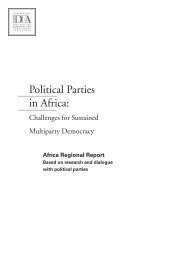Seminar Report The role of Political Parties in Democratic Transitions
Seminar Report The role of Political Parties in Democratic Transitions
Seminar Report The role of Political Parties in Democratic Transitions
Create successful ePaper yourself
Turn your PDF publications into a flip-book with our unique Google optimized e-Paper software.
<strong>The</strong> constituent assembly, however, was dissolved without giv<strong>in</strong>g the country a new constitution. In a<br />
review <strong>of</strong> nearly 25 years <strong>of</strong> competitive politics <strong>in</strong> Nepal, C.K. Lal showed that (a) <strong>Political</strong> parties are<br />
vibrant, but their <strong>in</strong>stitutionalization is <strong>in</strong>complete; thus also politics become very volatile and unpredictable<br />
(b) Civil society is active but lacks sizable number <strong>of</strong> volunteers; (c) <strong>The</strong> press is fiercely free, but<br />
susta<strong>in</strong>ability and accountability is <strong>in</strong> doubt; (d) International <strong>in</strong>fluence <strong>in</strong> the politics <strong>of</strong> the country is<br />
impossible to miss and one have to recognize that develop<strong>in</strong>g democracy must be consider<strong>in</strong>g both<br />
<strong>in</strong>ternal and external factors carefully. (e) Civil-military relation is yet to be stabilized; the military still plays<br />
an <strong>in</strong>fluential <strong>role</strong> and many measures have been put <strong>in</strong> place to ensure civil oversight <strong>of</strong> the military (f)<br />
Identity politics has come to stay; it is still the personal qualities rather than the policies that the voters<br />
unfortunately care about (g) Leaders have to balance their options between populism (group) and<br />
paternalism (loyal coterie).<br />
Mr C.K. Lal moreover underl<strong>in</strong>ed that the three ma<strong>in</strong> learn<strong>in</strong>gs <strong>of</strong> Buddha can also show the way for a<br />
healthy democracy: Wisdom, Alliance and <strong>The</strong> Right Path. He also drew attention to the importance <strong>of</strong> the<br />
choice <strong>of</strong> electoral system that fits each country best. <strong>The</strong>re will always be advantages and disadvantages<br />
<strong>in</strong> each system, but it is important to also to look for mixed electoral systems. F<strong>in</strong>ally, he stressed that one<br />
needs to write the constitution with a pen and not a gun and that all conflicts <strong>of</strong> <strong>in</strong>terest cannot be solved<br />
by parliament or courts. Nepal shows that you need well-established resolution mechanisms outside<br />
courts and parliaments. Multiparty dialogue with a focus on co-habitation and cooperation is key to<br />
strengthen<strong>in</strong>g democracy.<br />
<strong>The</strong> presentation was followed by comments by the discussant Mrs Ardeth Thawnghmung who also noted<br />
the many similarities between Nepal and Myanmar and <strong>in</strong> particular the quest for peace, the ethnic<br />
complexities and how to ensure common ground <strong>in</strong> sett<strong>in</strong>g the course <strong>of</strong> the nation.<br />
<strong>The</strong> participants had many questions <strong>in</strong> response to the presentation – ma<strong>in</strong>ly about a number <strong>of</strong> key<br />
issues such as: <strong>The</strong> relationship between military and civil and if the <strong>role</strong> <strong>of</strong> the military is still felt <strong>in</strong> politics<br />
today <strong>in</strong> Nepal; How the ethnic complexity <strong>of</strong> Nepal is dealt with <strong>in</strong> todays politics? Why the democratic<br />
period <strong>in</strong> Nepal <strong>in</strong> the 1950ees did not last? What are the pros and cons <strong>of</strong> a mixed electoral system <strong>in</strong><br />
Nepal and how would it function <strong>in</strong> Myanmar?<br />
Mr C. K. Lal responded <strong>in</strong> great detail to the many questions among other highlight<strong>in</strong>g that the past <strong>role</strong> <strong>of</strong><br />
the military is still felt today <strong>in</strong> Nepal, but with <strong>in</strong>creas<strong>in</strong>g civil oversight and that the issue <strong>of</strong> ethnicity is still<br />
on the agenda, but now peaceful talks are tak<strong>in</strong>g place.<br />
In general participants agreed that they were <strong>in</strong>terested <strong>in</strong> know<strong>in</strong>g more about the above themes and <strong>in</strong><br />
particular how to equip parties better for the democratic practice, to take good advice from electoral and<br />
constitutional experts and learned mediators on conflict resolution mechanism.<br />
1.7. Clos<strong>in</strong>g Session Day 1<br />
By Mrs Karijn de Jong, Senior Programme Manager, Netherlands Institute for Multiparty Democracy<br />
(NIMD)<br />
On behalf <strong>of</strong> the three organiz<strong>in</strong>g <strong>in</strong>stitutes - DIPD, NIMD and Nye<strong>in</strong> (Shalom) Foundation - Karijn De Jong<br />
extended a s<strong>in</strong>cere thank you to the participants for tak<strong>in</strong>g the time and <strong>in</strong>terest to jo<strong>in</strong> the sem<strong>in</strong>ar and<br />
actively share views, <strong>in</strong>sights, lessons and experiences on political transition processes <strong>in</strong> general and the<br />
<strong>role</strong> <strong>of</strong> political parties more particularly.<br />
In total 47 political parties across Myanmar’s political spectrum were present, which makes the gather<strong>in</strong>g<br />
unprecedented and truly <strong>in</strong>clusive and impartial. She expressed hope that the sem<strong>in</strong>ar will be just the start<br />
<strong>of</strong> a long partnership between the organisations and the Myanmar political parties and a cont<strong>in</strong>uation <strong>of</strong> a<br />
first step towards an <strong>in</strong>clusive process <strong>of</strong> <strong>in</strong>clusive multiparty dialogue and cooperation <strong>in</strong> Myanmar.<br />
<strong>The</strong> deliberations have been very <strong>in</strong>spir<strong>in</strong>g and <strong>in</strong>sightful and hopefully all participants have captured the<br />
richness <strong>of</strong> the discussions and leave with further ideas, reflections and food for thought to further<br />
cultivate Myanmar’s democratic transition process. Mrs Karijn de Jong hoped that all the participants take<br />
away at least one idea that he/she will take forward <strong>in</strong> terms <strong>of</strong> strengthen<strong>in</strong>g their own party organisations<br />
and/or further strengthen<strong>in</strong>g multiparty dialogue and cooperation.<br />
9
















